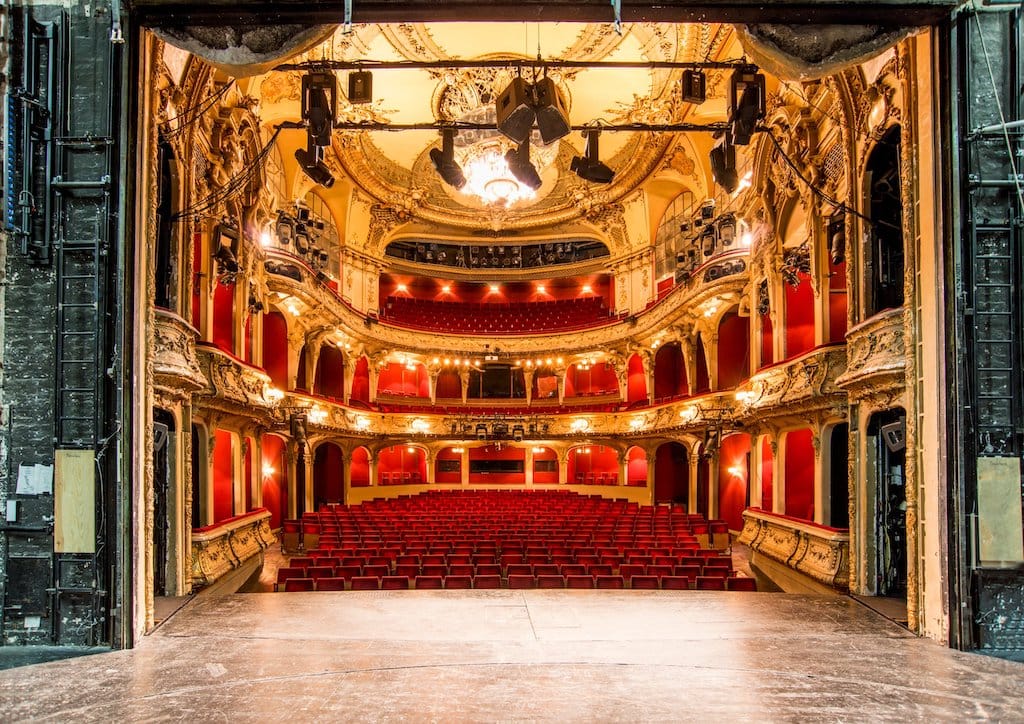The Performing Arts Dispatch: Berliner Ensemble

One could not have imagined that the site of a colossal neo-baroque structure, devoid of what fills and nurtures it— people, cheer and laughter—would turn into something poetically beautiful. Two years ago, Berliner Ensemble, the theatre company founded by Bertolt Brecht in 1949, decided to adapt to the woes of the pandemic by completely altering its seating design. The theatre uninstalled 500 of its 700 seats to adhere to the 1.5-metre distance rule. The large empty spaces became a statement in itself that the venue chose to make. The stripped down interior was not as haunting as it was evocative, metaphorical even. It is fair to question why they would not simply block the seats or allocate them according to a predetermined plan. “We want to create an experience that is special, that will anchor itself in people’s emotional memory,” artistic director Oliver Reese told The Guardian.
The philosophy reflects their long pedigree stemming from the founder. Brecht was arguably one of the most influential playwrights in history. His work rose to eminence at a time of acute anarchy within the German lands, riddled with hyperinflation and political extremism after the war. It is during this time that Brecht managed to capture truth with hard-hitting criticism. In its history spanning more than a century, Berliner Ensemble too, has striven to offer a critical look at socially relevant issues, especially with Brecht’s plays.
The Theatre am Schiffbauerdamm, at the Schiffbauerdamm riverside in Berlin, has been home to the Berliner Ensemble since 1954. The building is the largest auditorium, holding nearly 700 seats. The theatre celebrates its 130th anniversary this year. The more intimate venue, Kleines Haus, in Berliner Ensemble’s annexe houses 200 audience members. Since the 2019-20 season, two new fully-equipped venues, the Neues Haus and the Werkraum, have been in operation too. The latter is emerging as a space for new and innovative formats of performing arts.
Since Reese took over the mantle as Artistic Director in 2017, Berliner Ensemble has increasingly gravitated towards contemporary texts and subjects. A keen interest in developing artistic formats that blend new, state-of-the-art technologies with the classical components, capabilities and resources of theatre and opera has been of key focus. Efforts in the analogue and digital sphere, along with creating hybrid models of experiencing art, have also been actively pursued. A helpful feature is the German tradition of having an ensemble of actors affiliated with the theatre. It provides both flexibility and stability to expand and experiment with new ideas. This practice also turned out to be an economic advantage during the pandemic.
The resurgence of the Berliner Ensemble through the pandemic has been nothing short of impressive. The August season last year saw a new production of The Threepenny Opera, along with 20 premieres for the season. An endeavour to invite and embrace young, innovative and progressive storytellers has been made to establish a “new Brecht tradition at the house.” Christina Tscharyiski’s rendition of Brecht’s The Mother retains his intention of appealing to the population’s consciousness about workers’ exploitation, but also ropes in ideas of consumerism, feminism and existence in a digital world. Intrepid productions like Elfriede Jelinek’s Schwarzwasser were widely appreciated, while Ersan Mondtag provided a neoexpressionist lens to the works of Wagner and Brecht.
Surprising new additions include an adaptation of Arthur Miller’s The Crucible, with 21 performers taking the audience on a ghostly atmospheric outing. The most unanticipated entry would have to be the one-woman-show, It’s Britney, Bitch! It plays out as a homage to America’s princess of pop, as well as a chronicle of the 14-year-long conservatorship that dissolved last year, taking away her father Jamie Spears’s control over her personal and professional life. It doubles up as a commentary on female suffering and toxic masculinity.
The experimentation is a testament to the Berliner Ensemble’s unhindered courage, and conviction for the future. The company has emerged from the whirlwind of uncertainty and stood tall, if not stronger. It shows that it knows how to hold on to tradition while embracing change.
By Aishwarya Bodke. This piece was originally published by the National Centre for the Performing Arts, Mumbai, in the July 2022 issue of ON Stage – their monthly arts magazine.






